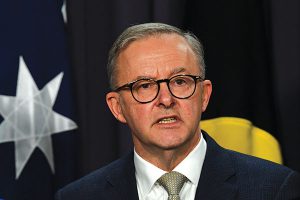Bloomberg
Anthony Albanese has been sworn in as Australia’s 31st prime minister in a short ceremony in Canberra, taking office with a promise of swift action on climate change, greater gender equality and improved wage growth.
Albanese moved quickly to be sworn in as Australia’s next leader as the PM is expected to fly out to Japan to take part in a meeting of the Quad security partnership in Tokyo.
The new leader will meet one-on-one with some of Australia’s most important security and economic partners in Tokyo, including US President Joe Biden, Indian Prime Minister Narendra Modi and Japan’s Prime Minister Fumio Kishida.
Albanese defeated former Prime Minister Scott Morrison at an election, which saw several senior ministers in Morrison’s government lose their seats including Treasurer Josh Frydenberg. Among the winners from the 2022 election were a large number of new lawmakers from minor parties and independent lawmakers who support action on climate change.
It is still unclear whether or not Albanese will be able to form a majority government in Australia’s 151-seat House of Representatives or if he’ll have to work with newly-elected minor parties and independent lawmakers to pass legislation.
However prominent members of the Labor leadership have said they are growing increasingly confident of winning enough to seats to govern on their own.
Albanese was sworn into power along with his deputy leader Richard Marles, and three senior members of the new Labor cabinet: Foreign Minister Penny Wong, Treasurer Jim Chalmers and Finance Minister Katy Gallagher.
The full cabinet and Albanese’s new ministry won’t be officially decided until after the prime minister returns from Japan. Speaking at his first press conference in Canberra, Albanese said his party would meet next week on Tuesday to decide the final make up of his ministry, which would then be sworn in on Wednesday.
When pressed on how he would deal with China now that he was prime minister, Albanese stuck to the position he stood on throughout the campaign. “The relationship with China will remain a difficult one. I said that before the election. That has not changed. It is China that has changed, not Australia. And Australia should always stand up for our values,†he said.
 The Gulf Time Newspaper One of the finest business newspapers in the UAE brought to you by our professional writers and editors.
The Gulf Time Newspaper One of the finest business newspapers in the UAE brought to you by our professional writers and editors.
